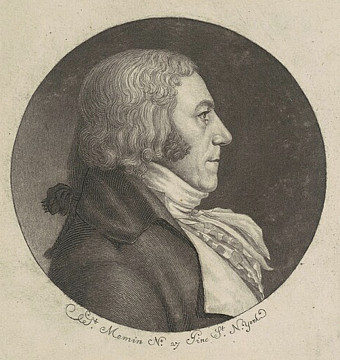Daniel Ludlow (1750-1814)
1st President of the Manhattan Company; of New York City, Long Island & Skaneateles
He was born in New York City. At fifteen, he was sent to his uncle, Daniel Crommelin's, counting house, Crommelin & Zoon, in Amsterdam. He stayed there for five years, mastering business and becoming acquainted with the French, German and Dutch languages. Returning to New York, he went into business with his father and later continued the business under his own name. Under him, Daniel Ludlow & Co. did the largest business at that time in the City of New York. The firm was principally engaged in the East India trade (they had a branch there), importing East India drugs, gums, etc. He was also the agent of the Holland Land Company and all their money and business in America was handled by him. In 1795, he took in his nephew, Gulian Ludlow, as a partner in Daniel Ludlow & Co. and in 1798 he was made a Director of the United Insurance Company. In 1801, Thomas Jefferson appointed him Navy Agent and in the same year he was appointed the first President of the Manhattan Company - the bank founded by Aaron Burr in 1799 that is better known today as Manhattan Chase.
After establishing himself in New York he went back to Europe in the 1780s to cement business relationships in all the major cities. While in Paris, he reluctantly witnessed the execution of Louis XVI and Marie-Antoinette. He recalled how the King had "exhibited fear" but the Queen "looked with the utmost scorn upon the people". In London, he lodged with Pascale Paoli, the former President of Corsica, and in the course of his travels for business he saw every crowned head of Europe before returning to the States. Along with John Barker Church and John Delafield, he was one of the three largest underwriters in New York and he lost $500,000 during the Quasi-War (1798-1800). He lost another immense sum by the Berlin and Milan decrees of Bonaparte, and in 1806 he lost several thousand more dollars by General Francisco de Miranda and Samuel Ogden. Nonetheless, his ships still sailed to every port in Europe, to the East and to the West Indies.
Daniel was described as, "a rich and prosperous merchant and shipowner, conducting branches of his extensive mercantile business in all parts of the globe; he was President of the Mercantile Bank of New York and of other financial institutions... The family resided in a magnificent country estate formerly the residence of Joshua Waddington (Director of the Bank of New York) but now called Baretto Point on the (Long Island) Sound." His townhouse at 56 Broadway (see images) was a large double house for which nearly a cargo of marble was used in its construction. It stood on the south corner of Garden Street and Broadway and stretched back to New Street. It later became Waverly House. From 1810, he retired to an estate at Skaneateles, New York (purchased from Jacobus Annis) where he died in 1814. In 1773, he married his brother's sister-in-law, Arabella, daughter of Thomas and Mary (Ketcham) Duncan. They had eleven children, five (listed) lived to adulthood.
After establishing himself in New York he went back to Europe in the 1780s to cement business relationships in all the major cities. While in Paris, he reluctantly witnessed the execution of Louis XVI and Marie-Antoinette. He recalled how the King had "exhibited fear" but the Queen "looked with the utmost scorn upon the people". In London, he lodged with Pascale Paoli, the former President of Corsica, and in the course of his travels for business he saw every crowned head of Europe before returning to the States. Along with John Barker Church and John Delafield, he was one of the three largest underwriters in New York and he lost $500,000 during the Quasi-War (1798-1800). He lost another immense sum by the Berlin and Milan decrees of Bonaparte, and in 1806 he lost several thousand more dollars by General Francisco de Miranda and Samuel Ogden. Nonetheless, his ships still sailed to every port in Europe, to the East and to the West Indies.
Daniel was described as, "a rich and prosperous merchant and shipowner, conducting branches of his extensive mercantile business in all parts of the globe; he was President of the Mercantile Bank of New York and of other financial institutions... The family resided in a magnificent country estate formerly the residence of Joshua Waddington (Director of the Bank of New York) but now called Baretto Point on the (Long Island) Sound." His townhouse at 56 Broadway (see images) was a large double house for which nearly a cargo of marble was used in its construction. It stood on the south corner of Garden Street and Broadway and stretched back to New Street. It later became Waverly House. From 1810, he retired to an estate at Skaneateles, New York (purchased from Jacobus Annis) where he died in 1814. In 1773, he married his brother's sister-in-law, Arabella, daughter of Thomas and Mary (Ketcham) Duncan. They had eleven children, five (listed) lived to adulthood.



